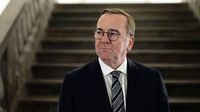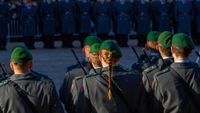Germany's Defense Minister Boris Pistorius is pushing for a swift introduction of a new military service model, aiming to commence its implementation this year. In an interview with the German press agency DPA, Pistorius emphasized that the groundwork for this initiative has been laid over recent months, allowing for the next steps to follow promptly after the formation of the new government.
"We have worked on the relevant foundations, so the next steps can follow immediately after the formation of the next government," said Pistorius, a member of the Social Democratic Party (SPD), in Berlin. The minister expressed optimism about the new model, which will initially be based on volunteerism, as outlined in the coalition agreement between the SPD and the Union party.
Military conscription in Germany was suspended in July 2011 after 55 years, effectively abolishing both military and civil service as the necessary structures were dismantled. However, the conscription could be reinstituted if a crisis arises, as the law allows for such measures in cases of heightened tension or defense scenarios.
Pistorius noted that the first steps in this new military service model would include the resumption of military registration and surveillance. "As soon as the legislative process is completed, we can begin to accept and train the first conscripts," he stated, indicating a proactive approach to rebuilding Germany's military capacity.
Despite the challenges posed by the early federal election, which Pistorius mentioned resulted in a loss of half a year in the legislative timeline, he remains determined to initiate the new military service this year. "We want to get the military service project on track quickly," he asserted.
Currently, the Bundeswehr, Germany's armed forces, consists of approximately 181,000 personnel, slightly down from 183,000 at the end of 2022. Pistorius indicated that the goal is to increase this number, including both active duty and reserve forces. He projected that Germany could see an additional 5,000 military service members in the first year of the new model.
To facilitate this expansion, Pistorius announced plans to engage in discussions with the Bundestag regarding future parliamentary involvement in armament projects. He suggested that the financial threshold for parliamentary oversight, currently set at 25 million euros, should be raised to streamline military procurement processes.
Moreover, he underscored the necessity for Germany to enhance its own arms production and development capabilities, aligning with the collective goal of European allies. "We need to focus more on our own arms production and development, which strengthens our defense capability and our economic location," Pistorius stated.
While acknowledging the importance of NATO and the transatlantic alliance, he also emphasized the need for Germany to cultivate a degree of independence from the United States in defense matters. "Complete independence from the USA is neither conceivable nor desirable in the next ten years," he remarked, highlighting Germany's pivotal role as NATO's largest partner in Europe.
Pistorius also welcomed an agreement to strengthen the Military Counterintelligence Service (MAD) and modernize its legal framework, which will be essential in adapting to evolving security requirements. He noted that with the establishment of the Lithuania Brigade and the permanent stationing of German soldiers at NATO's eastern border, the security landscape is changing.
"It is about expanded and new powers, even in regions where we have not been before," Pistorius explained, indicating a forward-looking approach to national security.
Criticism of the new military service model has emerged, particularly from the Left Party, whose co-chairman Jan van Aken accused the Union and SPD of attempting to impose "coercion through the back door". He called for a public referendum among 16 to 25-year-olds to gauge their opinions on the reintroduction of conscription, particularly in light of the risks associated with overseas deployments.
In contrast, Eva Högl, the Parliamentary Commissioner for the Armed Forces and a member of the SPD, proposed a mandatory social year for both men and women, which could include military service as an option. She emphasized the need for a comprehensive societal model that requires mandatory registration without disadvantaging individuals in their professional careers.
As Germany stands on the brink of redefining its military structure, the coming months will be critical in determining the effectiveness of these proposed changes. Pistorius remains optimistic about the potential for a successful rollout of the new military service model, which he believes is essential for strengthening Germany's defense capabilities.
With international security dynamics shifting, the focus on enhancing military readiness and fostering a robust volunteer base could play a pivotal role in shaping the future of Germany's armed forces.







